My content is reader-supported by awesome people like you. Which means I could earn a commission. Learn more here!
Choosing the right eCommerce website builder can feel overwhelming:
there are so many options, and picking the wrong one could mean wasted time, lost sales, and frustration.
Whether you’re launching your first online store or looking for a better platform to scale your business, you need a builder that’s easy to use, packed with features, and built for growth.
So, which one is the best for your needs?
In this guide,
We’ll break down the best eCommerce website builders, their strengths and weaknesses, and which one will help you more for your needs.
How We Test These Platforms
| Ease of use | Is it easy to sign up for, and is there guidance to not fail |
| Customer Support | I gotta see this somehow |
| Tools it offers (Marketing, SEO, Product Tools) | We need tools without venturing out to other companies all the time |
| 25-point feature checklist | It can be my secret sauce. It includes other areas but it lets me know how it’s doing. |
| Actual customer user ratings | I set out and found actual other users that use this product for their business. These can be on review sites, forums, or my reader’s opinions to give you an idea. |
| Testing project | I try to run it through a project I feel good about |
| Overall rating | After compiling data, I give it a rating. |
What Makes the Best eCommerce Website Builder?
As we test and put this article together here are key things that are nice to see as we test. These play a vital role in helping us which help you decide.
1. Ease of Use and Design Flexibility
A good platform empowers a tech-savvy business owner to create a stunning, responsive store without coding expertise. The platform should offer modern themes that can be customized to reflect the brand identity.
2. Ability to Sell Anything, Anywhere
Top platforms allow seamless sales of both physical and digital products while managing taxes and international shipping. This ensures scalability as the business grows.
3. Full-Service eCommerce Capabilities
Beyond just selling, the platform should manage inventory, process orders, and handle backend operations, eliminating the need for additional services or clunky spreadsheets.
4. Robust Integrations and Automation
Integration with essential business tools is vital. The best builders connect with accounting software, CRM tools, and marketing platforms through APIs, extensions, or platforms like Zapier.
5. Transparent and Affordable Pricing
Clear, predictable pricing with no hidden fees is essential. While done-for-you solutions can be costly, most SMBs need affordable, scalable platforms that align with their growth goals.
These criteria ensure that business owners get the functionality they need while staying within budget. When evaluating platforms, I personally test them by creating an online store to ensure they meet these standards.
How Can You Choose The Right eCommerce Platform To Build Your Store?
I think below are some good questions to ask yourself and really focus on in deciding.
1. Ease of Use – Can You Set It Up Without Hassle?
If you’re new to creating a website, you’ll want a user-friendly platform with a simple setup process.
Look for:
- Drag-and-drop editors for easy design customization
- No coding is required to launch and manage your store
- Intuitive dashboard for managing products, orders, and customers
Best for beginners: Shopify, Wix , Squarespace
Best for flexibility with a learning curve: WooCommerce, BigCommerce
Note: Many of them are implementing AI so getting started is getting easier and easier.
2. Cost & Pricing – Does It Fit Your Budget?
E-commerce platforms come with different pricing models. Some charge monthly fees, while others take transaction fees. Compare:
- Subscription costs (monthly/annual pricing)
- Transaction fees (some platforms charge extra per sale)
- Additional costs (like apps, plugins, themes, and hosting)
Best for all-in-one pricing: Shopify, BigCommerce
3. Features & Scalability – Will It Grow with Your Business?
Your online store needs the right features to scale. Consider:
- Product limits – Some platforms cap the number of products you can sell
- Multi-channel selling – Can you sell on Amazon, Facebook, Instagram, or TikTok?
- SEO & marketing tools – Built-in email marketing, SEO optimization, and discount codes
- Advanced e-commerce features – Abandoned cart recovery, customer segmentation, and automation
Best for scalability: Shopify, BigCommerce
Best for small stores with basic needs: Wix, Squarespace
4. Payment Options – Can Customers Pay Easily?
Make sure the platform supports multiple payment gateways so customers can pay with their preferred method. Consider:
- Credit/debit card processing
- PayPal, Apple Pay, and Google Pay integrations
- Buy Now, Pay Later (BNPL) options like Klarna or Afterpay
Best for built-in payments with no extra fees: Shopify (with Shopify Payments)
Best for third-party payment flexibility: WooCommerce, BigCommerce
5. Design & Customization – Can You Make It Look the Way You Want?
Your store should reflect your brand. Look at:
- Available themes – Are they modern, mobile-friendly, and customizable?
- Customization options – Do you need coding knowledge to make design changes?
- App/plugin marketplace – Can you add extra features easily?
Best for easy, beautiful store designs: Shopify, Squarespace, Wix
Best for total customization control: WooCommerce (WordPress-based)
6. Customer Support – Will You Get Help When You Need It?
Reliable customer support is crucial if something goes wrong. Consider:
- 24/7 live chat or phone support
- Community forums & knowledge bases
- Access to expert help if needed
Best for 24/7 support: Shopify, BigCommerce
Best for self-support & community help: WooCommerce
Comparison Chart
Top 6 E-commerce Website Builders
| Rank | Platform | Rating | Best For | Starting Price | Action |
|---|---|---|---|---|---|
| 1 | Shopify |
★★★★½
|
Serious eCommerce businesses of all sizes | $29/month | Get Started |
| 2 | Wix |
★★★★★
|
Small businesses and beginners | $17/month | Get Started |
| 3 | BigCommerce |
★★★★★
|
Growing businesses with scaling needs | $29.95/month | Get Started |
| 4 | Squarespace |
★★★½★
|
Design-focused brands and creatives | $23/month | Get Started |
| 5 | Hostinger |
★★★½★
|
WordPress users and budget-conscious sellers | $9.99/month | Get Started |
| 6 | Volusion |
★★★★★
|
Product-focused small businesses | $26.10/month | Get Started |
Shopify #1 overall eCommerce Platform

It’s the legit eCommerce platform that for the most part is future-proof as you grow and you won’t need to migrate away from it to find something that can handle more.
I get I test and rank and put it at number 1 but so do many other forums and rankings sites.
When you look at their case studies all broken down of companies using Shopify they are impressive and so are there action plans.
Let’s break Shopify down a bit:
Why I Like Shopify
1. Super Easy to Use – No Tech Skills Needed
One of the biggest reasons Shopify is so popular is its user-friendly interface. You don’t need to know how to code or have any technical knowledge to set up a store.
Shopify guides you through the entire process, from picking a theme to adding products and setting up payments. The drag-and-drop editor makes customizing your store simple, and everything is designed to help you launch quickly.
2. All-in-One eCommerce Solution
Shopify isn’t just a website builder—it’s a full-fledged eCommerce platform that provides everything you need to run an online store.
Some standout features include:
- Built-in payment processing (Shopify Payments)
- Multi-channel selling (sell on Facebook, Instagram, Amazon, and more)
- Automatic tax calculations
- Abandoned cart recovery
- Advanced analytics & reporting
The thing I can’t say enough about Shopify is it’s future-proof for you and can scale out with you not needing to migrate away from it.
3. Scalable for Businesses of All Sizes
Whether you’re just starting or running a high-volume store, Shopify can handle it. Small businesses can start with the basic plan, while larger businesses can scale up to Shopify Plus, which offers enterprise-level features like automation tools and dedicated support. You won’t outgrow Shopify, which means you won’t have to switch platforms as your business grows.
4. Great for Marketing & SEO
Driving traffic to your store is just as important as setting it up. Shopify has built-in tools to help you market your products:
- SEO features to help you rank on Google
- Discount codes and promotions to increase conversions
- Email marketing integrations
- Easy-to-run ads on Facebook, Instagram, and Google
If you want to grow your business without relying only on paid ads, Shopify’s built-in SEO and marketing tools make that easier.
5. 24/7 Support & Security
Shopify offers 24/7 customer support via live chat, phone, and email. If you ever run into an issue, help is available. Additionally, Shopify handles security for you—your store comes with SSL encryption and PCI compliance, so customer data stays safe.
6. Impressive Free Trial
I noticed Shopify offers legit free trial periods. A lot of time I see 1 month to 3 months for a buck a month which gives you a ton of time to get started on a budget of about 3 bucks total. This gives you a ton of time to build your online store for about nothing and I like that. By the time you launch you have invested a small amount but probably have everything set up.
7. AI Features (Shopify Magic & Sidekick)
Shopify has been integrating AI within its platform and making steps a ton easier. You can now enter a prompt to build out your theme and it also helps build out your products too. I think once you try these features you will be impressed by how quickly you can build out your online store and structure. If you want an example you can check out this step-by-step I did building a store and using AI.
Some Drawbacks to Consider
Shopify is great, but it’s not perfect. Here are a few downsides to be aware of:
1. Monthly Costs Add Up
While Shopify’s plans start at $29/month, it’s possible you will need extra apps for things like advanced reporting, subscriptions, or upselling features. These add-ons can increase your monthly expenses beyond the base price. Of course, we can all agree this can be on any platform it’s just that Shopify offers so much and you can do a ton to do more which can expand your costs.
2. Transaction Fees (Unless You Use Shopify Payments)
If you use third-party payment gateways like PayPal or Stripe instead of Shopify Payments, Shopify charges an extra transaction fee (ranging from 0.5% to 2%). This can eat into your profits if you process a lot of orders.
3. Limited Design Customization Without Code
While Shopify has beautiful themes, full customization requires knowledge of Liquid (Shopify’s coding language). If you want to make major design changes, you might need a developer’s help. They are getting better with this and the AI features with Shopify magic are now offered.
Who Is Shopify Best For?
Shopify is a great choice for:
- Beginners who want an easy-to-use platform – The setup process is simple, and no coding is required.
- Small businesses looking to scale – Shopify grows with your business, offering powerful tools for expansion.
- Dropshippers – Shopify integrates well with Oberlo, Spocket, and Printify for easy dropshipping.
- Retail stores going online – Shopify’s POS system lets you sell in person and online seamlessly.
- Brands selling on multiple channels – Sell on Amazon, Facebook, Instagram, and TikTok directly from Shopify.
Is Shopify Worth the Price?
For most businesses, yes—Shopify offers great value for what you get.
I hear that sometimes it’s not the cheapest option, but honestly, if you can get it for $29 monthly with everything that is included, I’m struggling to see this.
I feel many might be taking into concept needing apps that can cost money.
The thing is, though, tools are always needed.
Where you’re seeing it set itself apart is being dedicated to eCommerce and offering e-commerce at every plan, unlike other platforms like Wix or Squarespace.
Wix: Quick Setup with AI & Impressive Templates
Wix has grown like crazy with over 77 million users across 190 countries – and for good reason.
What grabbed my attention first was how fast I could get a site up and running. Without any prior Wix experience, I had a basic site ready in about 5 minutes!
The sign-up process is super smooth. Wix helps you pick the right template by asking what kind of store you want to create.
For example, if you’re starting a clothing shop, Wix immediately shows you templates designed specifically for fashion retailers. This gives you a head start and saves tons of time.
What I Like About Wix
- Lightning-fast setup (seriously, about 5 minutes)
- Easy drag-and-drop editor makes design changes simple
- 24/7 support when you need help
- Mobile-optimized sites work great on phones
- Huge template library with industry-specific designs
- Built-in blog features to boost your SEO
Wix Pricing Plans
| Plan | Monthly Cost | Features |
|---|---|---|
| Light | $16 | Basic website features |
| Core | $27 | Entry-level eCommerce features |
| Business | $32 | Full eCommerce functionality |
| Business Elite | $159 | Advanced features for larger stores |
| Enterprise | Contact for pricing | Custom solutions |
My Wix Testing Experience
When testing Wix’s page speed using Pingdom, one site I checked scored 89 (B ranking) with a load time of 403ms – faster than 98% of tested sites. Pretty impressive!
The template selection process was straightforward. During sign-up, Wix lays out all options clearly, making it easy to choose the right design for your store.
What Could Be Better
Customer service response times need work. When I reached out with a question, it took over a day to get my first response. In today’s fast-paced business world, that’s too long to wait.
Wix would benefit from adding live chat support for faster problem-solving.
BigCommerce: Serious Tools for Serious Sellers
BigCommerce works well whether you’re just starting out or running a large online store. Their platform comes packed with features that make selling online much easier.
Key Benefits of BigCommerce
- Powerful SEO tools to help customers find your store
- Conversion-focused features that turn visitors into buyers
- Marketing tools that make promotion easier
- Flexible product options for complex inventories
- Detailed analytics to track your performance
- Top-level security for you and your customers
- Multiple payment options for checkout
BigCommerce Pricing
| Plan | Monthly Cost | Transaction Fees | Credit Card Processing |
|---|---|---|---|
| Standard | $29.95 | None | 2.9% + $0.30 per transaction |
| Plus | $79.95 | None | 2.5% + $0.30 per transaction |
| Pro | $299.95 | None | 2.2% + $0.30 per transaction |
| Enterprise | Custom | None | 2.2% + $0.30 or lower |
My Testing Experience
Getting started with BigCommerce was quick – I reached my dashboard in under a minute after signing up for the first time.
Finding and selecting a theme took me a few minutes, mainly because I needed to get familiar with the navigation. Once I figured it out, the process was simple.
One downside: when looking for support options from my dashboard, I could only find email support. I prefer instant help options, especially for urgent issues. While their service quality is good overall, the lack of immediate support is a drawback.
Squarespace: Clean Designs with eCommerce Power
Squarespace started as a personal blog hosting service but has grown into a major website builder hosting over a million sites.
Squarespace Pricing Options
| Plan | Monthly | Annual (per month) |
|---|---|---|
| Personal | $23 | $16 |
| Business | $33 | $23 |
| eCommerce Basic | $36 | $27 |
| eCommerce Advanced | $65 | $49 |
What Makes Advanced Better Than Basic?
- Abandoned cart recovery – sends automatic emails to shoppers who didn’t complete checkout
- Real-time shipping calculations for accurate costs
- Complete control over store promotions and discounts
- Digital gift card sales capability
- Order API access for custom integration with other systems
Squarespace Templates
When I checked, Squarespace offered 12 dedicated online store templates. While not a huge number, they’re all clean and professional-looking.
One thing I’d like to see is a template marketplace for more options or premium designs. For now, they do offer a developer section where you can hire help to customize your site.
Hostinger: This Is Going To Use WooCommerce
Hostinger offers a complete package for launching an online store quickly.
Key Features
- All-in-one solution with hosting, free domain (first year), and eCommerce tools
- AI-driven website builder with drag-and-drop editing
- Over 150 templates to choose from
- Zero transaction fees (though payment processors may charge their own)
- Support for 100+ payment methods globally
- 24/7 customer support and 99.9% uptime guarantee
Hostinger Pricing Plans
| Plan | Monthly Cost | Features |
|---|---|---|
| Premium | $12.19 (deals as low as $1.99) | Basic hosting |
| Business | $13.99 | Business-focused features |
| Cloud Startup | $7.59 | Entry cloud hosting |
| WordPress Hosting Premium | $12.19 | WordPress optimized |
| WordPress Hosting Business | $13.99 | Enhanced WordPress |
| WordPress Hosting Cloud Start-Up | $24.99 | Cloud WordPress |
| Cloud Professional | $39.99 | Advanced cloud hosting |
| Cloud Enterprise | $64.99 | Enterprise-level solution |
Pros and Cons
Pros:
- AI tools make site creation fast and easy
- Comprehensive package with everything needed to start
- No transaction fees from Hostinger
- Wide range of payment options
- Reliable support team
Cons:
- Limited to 500 products (might be an issue for larger stores)
- Learning curve for complete beginners
- Third-party payment gateways may charge fees
- Template selection might feel limited for specific needs
Volusion: Visual Product Showcase Expert
Volusion stands out for making products look great online. Their clean design approach helps showcase physical products effectively.
Notable Benefits
- Simple SEO tools to improve search rankings
- One-page checkout for easier customer purchases
- Auto-generated site map
- Built-in email marketing tools
- Streamlined payment processing
- Daily website backups for peace of mind
Volusion Pricing
| Plan | Monthly Cost |
|---|---|
| Personal | $29 |
| Professional | $79 |
| Start-Up | $179 |
| Business | $299 |
My Test Experience
When reaching out with questions, I initially found only an email form.
However, within minutes I was connected to a live chat representative, which was a pleasant surprise.
The signup process for a free trial was smooth, and adding a template was straightforward thanks to their visual home screen interface.Tips for Choosing Your eCommerce Platform
- Match your technical skill level – Some platforms are easier for beginners than others
- Consider your growth plans – Will the platform scale with your business?
- Count your products – Some platforms limit how many items you can sell
- Factor in all costs – Look beyond the monthly fee to transaction fees and payment processing
- Test mobile responsiveness – Make sure your store looks good on phones
Pro Tip: Always sign up for free trials before committing to a platform. There’s no substitute for hands-on experience with the tools you’ll be using daily.
Each of these platforms has strengths depending on your specific needs. The right choice comes down to your business goals, technical comfort level, and budget. I hope this breakdown helps you find the perfect fit for your online store!
How Much Can an eCommerce Website Cost?
When setting up an eCommerce website many of just think about the price of the plan which is cost but there are other factors that go into it.
- Platform/Software Fees:
Monthly subscription plans range from $20 to $300+, depending on features and business size. - Transaction Fees:
Payment processors like Stripe or PayPal charge around 2.9% + $0.30 per transaction. For example, selling a $100 product incurs a ~$3.20 fee. - Payment Gateway Fees:
Some platforms charge additional fees for using third-party payment gateways (e.g., 1-2% per transaction). - Additional Costs:
Domains ($10–$20/year), premium themes ($50–$200), and add-ons like SEO or email marketing tools can add up.
Understanding these fees helps businesses budget effectively and maximize profits.
Best eCommerce Website Builders Frequently Asked Questions
What's the best ecommerce website builder for beginners?
If you're new to the eCommerce game, Shopify or Wix walks the line between simplicity and power perfectly. Its intuitive drag-and-drop interface is a breath of fresh air for anyone who doesn't want to touch code, while still offering robust features to get your online store up and running smoothly.
Are there any decent free ecommerce website builders out there?
Square Online gets my nod here. It allows you to launch an online store without dipping into your funds. While it's basic compared to paid options, it's definitely a solid starting point. As your business grows, you might want to upgrade, but it's a great way to test the waters.
Which eCommerce platform is the best for SEO?
Shopify takes the cake for SEO. It dishes out all the SEO goodies you'd need – straightforward tools for customizing your titles, meta descriptions, and URLs, plus it gets behind-the-scenes stuff like sitemaps and SSL certificates right too. Handy if you're looking to play nice with Google.
Can I sell on social media with eCommerce builders?
Both Shopify and BigCommerce shine in this department, offering slick integrations with social channels like Facebook and Instagram. It’s a straightforward way to extend your store's presence and tap into social commerce without much fuss.
What about dropshipping capabilities?
Shopify and BigCommerce, again, are top picks for dropshipping. They offer seamless integrations with major dropshipping apps like Oberlo, allowing you to populate your store with products directly, without having to deal with inventory physically. Super useful for getting started quickly.
Is switching eCommerce platforms a headache?
Transitioning between platforms isn’t the simplest of tasks, but it's far from impossible. Most leading platforms offer migration tools or guides to help make the move as smooth as possible. My advice? Go for a platform that can scale with your business to minimize the need for such changes.
How important are mobile features in ecommerce builders?
In this day and age, hugely. Platforms like Shopify and Wix ensure your online store is not just mobile-friendly but shines on mobile devices. Considering how much shopping is done on phones, this is non-negotiable for reaching your audience where they are.
Can I manage my eCommerce store on my phone?
Yes, and it’s pretty cool. Leading platforms provide mobile apps that empower you to manage orders, inventory, and customer queries from anywhere. It means your business moves with you, making life a bit easier.
What payment options can I offer with these eCommerce platforms?
The more, the merrier. Shopify, Wix, and BigCommerce let you accept a wide range of payment options – think credit cards, PayPal, and digital wallets like Apple Pay. Catering to customer preferences can definitely nudge those conversion rates northward.
What's the deal with customer support from these platforms?
Top-notch, generally. Whether it's comprehensive help centers, live chat, or email support, help is at hand. Some, like Shopify and BigCommerce, also offer 24/7 phone support, which is gold when you need answers fast.
Conclusion On The 6 Best eCommerce Website Builders
Choosing the best eCommerce online solution doesn’t have to be difficult.
I’ve shown you the top 5 online store builders.
It’s now just time for you to choose and test.
Remember, it doesn’t cost anything to try them so have fun.
Each one has great benefits that can help you get online.
Just to recap in case you forgot:
The 6 Best eCommerce Website Builders Are
-
Shopify
-
Wix
-
Bigcommerce
-
Squarespace
- Hostinger
-
Volusion
Have fun testing them, and get your hands dirty.
Let me ask you something, too:
Have you had the chance to try any of these yet?
Or do you have a question in regards to using them?
Drop me a line below if you need help, or have a question.
If you want 1 on 1 help though head over to my contact page and we can talk via email
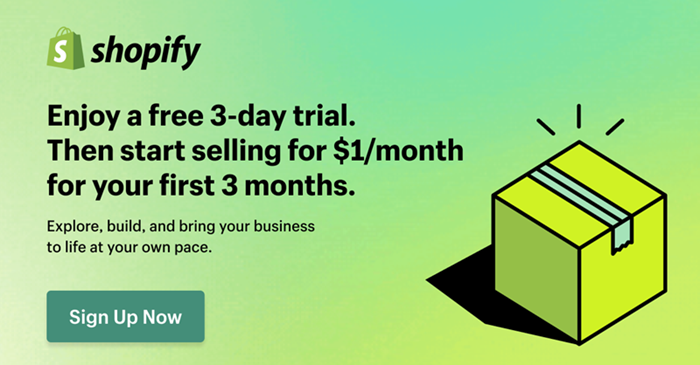
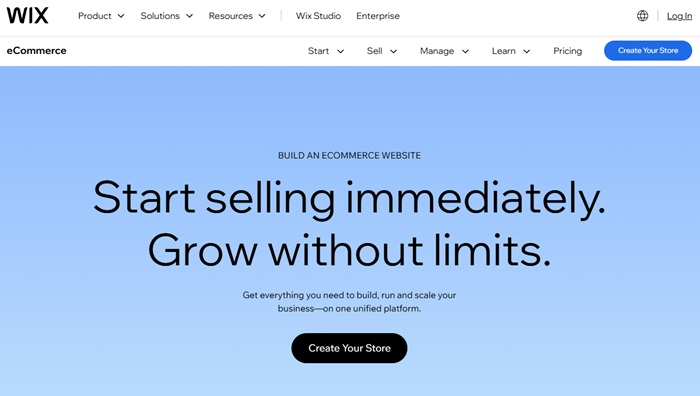
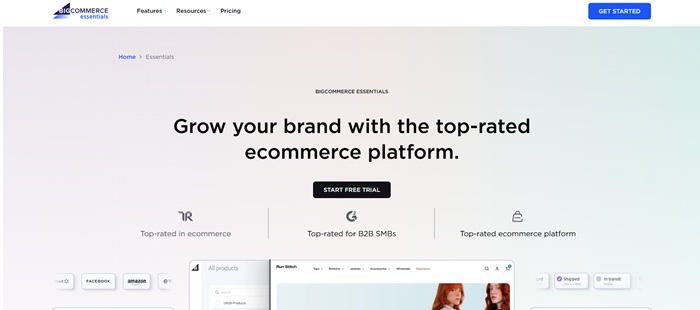
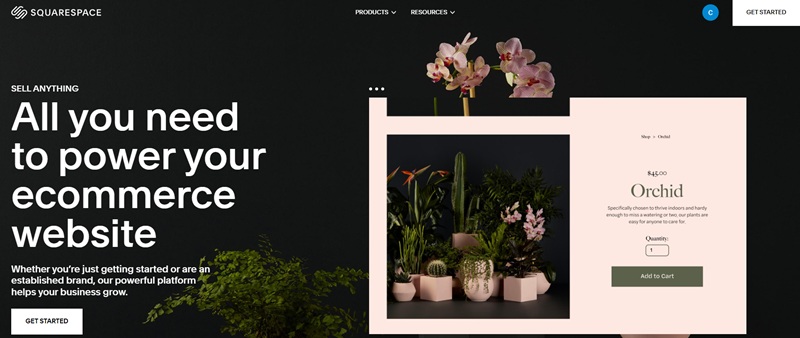
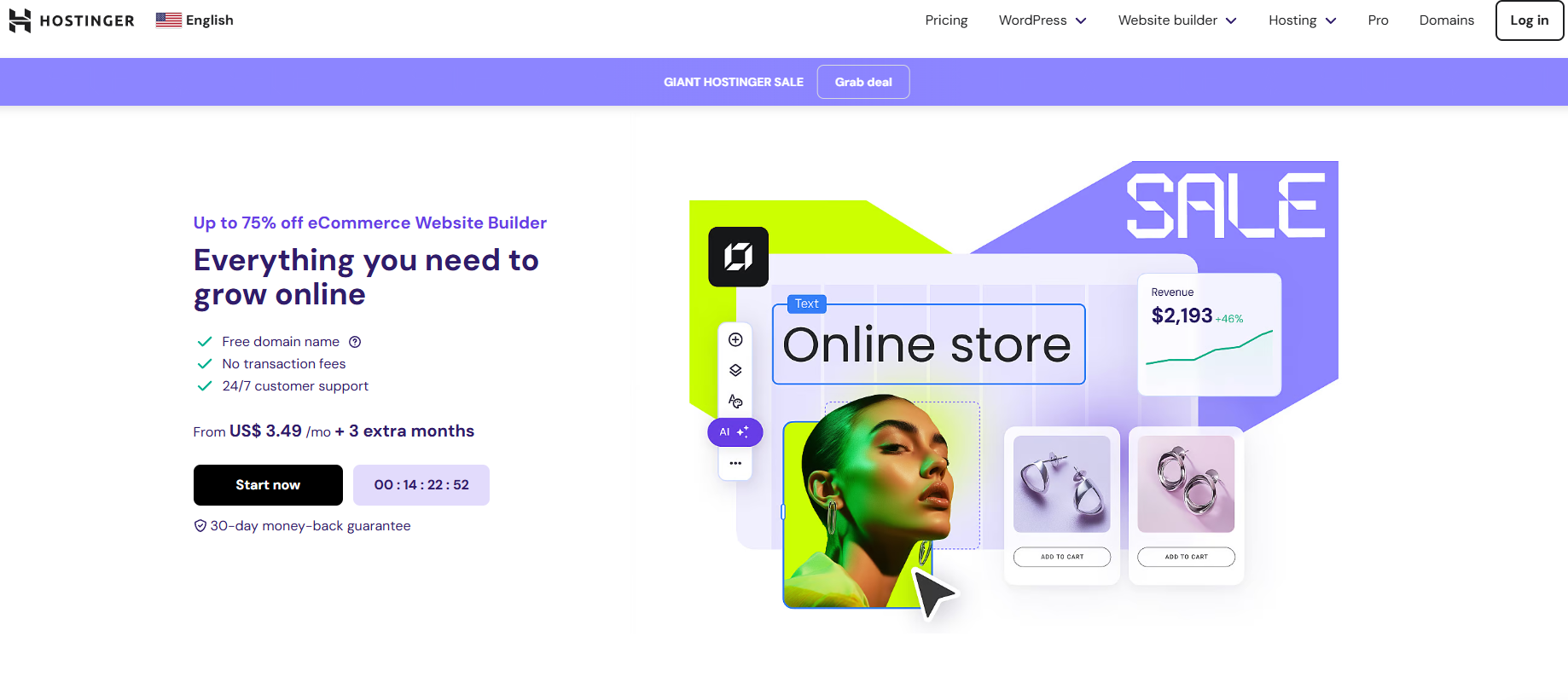
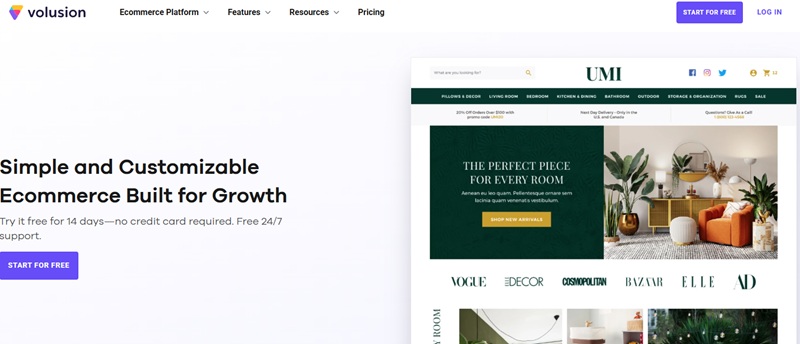




Thanks for sharing. I would definitely vote for Shopify.com as all in one solution for online stores. I would also recommend yoyosites.com as the simplest builder, fully customised at very affordable price.
Hi Dima,
Appreciate your input.
Thanks,
Chris
Thank you for sharing this post. It was really very informative and it will help me to understand that which website builder would be perfect for me.
Thanks, Bob! I’m glad it helps!
I definitely must admit I agree. I made my site for desktop because I wanted to show people how beautiful an anime site could be and now, when I worry about making it workable for smaller mobile devices (I’m skipping iPads & other tablets since their screens are bigger), dread comes over me because all the things my sites designed to do when they look at it (originally) is lost. It’s extremely irritating trying to deal w/the limited options of wptouch plugin for wordpress…and wptouch pro isn’t much better unfortunately. -_-” …..it makes me sad-face
Hey Harold,
UGHHHHHHHHHHHHHH, that can be frustrating when that happens.
Maybe testing out a few more options!!!
Have you tested any other options?
Thanks,
Chris
I am in fact thankful to the owner of this website who has shared this enormous piece of writing at at this place.
Thanks, Ian
Great Article!
Big Thanks. Its Really Going to help me with my project on E-commerce and its details. Thanks Again
Thanks, Jack! I’m glad to hear it’s helping you out.
Awesome article, Shopify is my favourite eCommerce platform, it’s just so user friendly and easy to get started. I mean take a look at their stocks and a lot of big companies using them.
I agree Joshua!!! It’s a great platform!
These are some solid website builders which can help you achieve your target but if you are looking for some more options, then you should definitely check out StoreHippo. It can help you create an online store to give your buyers omnichannel experience.
Appreciate your input
Thank you so much for sharing this article. The list you mentioned for building e-commerce website is really appropriate and you have added every detail in it.
Thanks so much,
I put a ton of time into this bad boy 🙂
Happy Thanksgiving!
Thanks,
Chris
Hi Christopher, great article. I use shopify for my business website, the Ecommerce Development is now easier with website builder.
Thanks for your input 🙂
Helpful guidelines! Thank you for sharing these website builders as they have helped me understand which one is better for me. Kindly share some write-ups on print-on-demand drop shipper as it will help me a lot to fill my knowledge. Thank you!
Thanks Roses!!!! I’m glad it helped you out!
Hello, Christopher.
Such a great list of e-commerce website builders. Really interesting.
I think Squarespace and Magento would also be a good fit in the post. I really loved them. Otherwise, the post is simply fantastic.
I have gained some knowledge through this article in which I also learned, and I will inform others about these website builders that you have posted. I am definitely looking forward to reading more such blog posts from your end in the future.
Thanks for sharing.
Hey Emma,
Those are two great ones for sure.
I currently have Squarespace on there but not Magento.
The only reason Magento isn’t is because of the learning curve and I don’t look at it as a website builder.
Hopefully that makes sense.
Thanks for the kind words too.
Thanks,
Chris
Fine way of explaining, and pleasant paragraph to obtain information about
my presentation focus, which i am going to convey in college.
Thank you!
Hi I’m migrating away from BC at present what I have found is they seem to leave little things out that make you have to go to bc partners really you need to take there fee then times it by 6 to get decent and there support team are awful my most recent interaction with support saw me receiving laughing emojis as a response to me pointing out I am a paying customer if you are a beginner without any coding experience do some research and don’t believe everything they say
Thank you so much for Sharing an informative Article!
Honestly, this post will obviously help a lot of people on what makes up good content and how to structure it for the best result. Actually, I am confused about Choosing Online Store Design. Best eCommerce Platform is help in build eCommerce SEO and improve Ranking. Thank you for the clear and concise information.
Thanks for your input!
Brilliant post,
There are many e-commerce website builders available in the market. There is no dearth of website builders. A constant debate is, which of the website builders are best for e-commerce. On a second thought which one is better – a paid or free builder? https://www.rapportrix.com/ecommerce-website-builders-free-vs-paid
Thanks very much!
Hi Chris,
Am looking to set up a business site for a fitness brand and want to sell a very limited range of digital products. My primary aim is a site to educate clients about my services but also sell some products. I want to keep costs down and notice many e-commerce options are about the £200 mark per year. I own a WordPress site which has it’s own domain for about half that. Some of the cheaper options are ranked lower on your list but which would you recommend for a very basic selling service as part of a website builder with low costs and my own .com domain ?
Any advice greatly valued.
Thanks
Ben
Hey Ben,
Sounds like you took the step and got involved in WordPress which is a very good option too. Just to ask, how many services do you offer, and is this for local clients or more national?
Just wanted to ask you this to assist you a bit more .
Thanks,
Chris
Love the spirit here ? and a great job
Thank you!
Hey Ansari,
Thanks for your input 🙂
Thanks,
Chris
Hey Charlette,
Is the beauty platform selling the products?
Fee free to email me on my contact page and I can help you out more if needed 🙂
Thanks,
Chris
Hi there I am just wondering what website would you think is best for a beauty platform offering nsht services and for online bookings ?
Hey Charlotte,
I think it may depend on what your overall goal may be.
Would you be drop shipping your beauty products?
Thanks,
Chris
hi,Christopher
i am using woocommerce it help me lot.another shopify is also good platform for e commerce store.
I’m sure Woocommerce is working great for you too!!!!
Did you use to run on Shopify?
Thanks,
Chris
Hello Christopher,
Very helpful information
Thank you!
Hi Jason,
Congrats on your own eCommerce platform.
Thanks,
Chris
I have tried shopify, volusion, and 3d cart. They each have some very good features, but I wanted something simple, easy to use, and something that I could have absolute control over, so I built my own – Jason’s Cart. Originally I built it for myself to use to build my clients websites with, but I have had over 100 people download it since I went live with it less than a month ago. I am hoping that it takes off and I get thousands of people to use it. I have several templates that I am going to be uploading that can be purchased as well. Templates are extremely easy to install.
Hi Yasar,
I love WordPress too.
Just to ask you, are you selling on your website?
Thanks,
Chris
Hello Christopher,
Thank you a lot for sharing these amazing website builders.
I have been using WordPress platform & love it.
Thanks
Thank you for a great review.
I am looking for a platform where retailors an list their products, this is for a giftshop. Small and we focus on one country only.
Hey Mignon,
I’d assume maybe like eBay? Where they can create a store within their site.
Or well:
Like Etsy too.
Thanks,
Chris
Hey Chris, thanks for putting all this together.
Please i need your honest opinion and useful suggestion, please I want a website like this e.g… ( http://www.cargurus.com or http://www.truecar.com or http://www.cars.com or http://www.autotrader.com )
Please check them all out on your free time and let me know what you think.
Your honest suggestion please.
Thanks so much.
Hey Eddy,
Dude, awesome idea by the way.
One thing you could do is start a WordPress site and use a WordPress theme like this one in the link.
https://themefuse.com/wp-themes-shop/auto-wordpress-theme/
What’s your thoughts?
Thanks,
Chris
Hey Chris, thanks for putting all this together. Good observations. I am just curious why you did not include WooCommerce in your list, since it’s the most popular eCommerce platform, powering around 40% of the stores in the world? ? No solution is perfect of course, but Woo offers a lot of compelling benefits and value.
Thanks,
David
Hey Hey Dave,
Super fair question to ask.
WooCommerce is a great one but without the experience with utilizing it, the learning curve is higher and you can’t get started same day.
I always tell anyone if they are familiar with integrating it with WordPress to def check it out.
But these are focused around an easier approach that anyone could do now.
Or better terms, website builders as in all in one eCommerce solutions.
Thanks,
Chris Pontine
Shopify is definitely a great website builder for small and medium size businesses. But how well do they fare in terms of SEO compared to wordpress?
Hey Nathaniel,
I agree on Shopify.
Personally I think they fair great with SEO.
The thing thought.
At the end of the day you have to focus on your own SEO efforts.
Because if done wrong it doesn’t matter what platform your on.
Key things to focus on are.
Long Tail Keywords
Utilizing your keyword in the title.
ALT Tags
META Descriptions
Your sitemap.xml file
Thanks,
Chris Pontine
Hi Chris, thank you for the post! Do you only consider hosted site builders? Any experience with open source? We are considering nopCommerce, Magento and Prestashop. Would appreciate any feedback.
Thank you!
Hey AMA,
Yes, mainly website builders. 🙂
I def like these other options though too.
Contact me on my contact form and we can talk more.
Thanks,
Chris
Thanks for sharing these tips, Chris.
I own a website in the content marketing space, but more and more, I’ve been drawn to ecommerce. And I’ve been looking up various (potential) products to sell via ecommerce.
I think Shopify of BigCommerce would be suitable choices to start off with. I’ve heard too many bad stories about Wix so I think I’m going to avoid them all together.
Thanks again for this post and the breakdown.
– Andrew
This is sort of a weird question, but what one would be best suited for a “subscription” based service? Also do any of these create databases with the orders?
Hi Logan,
I don’t think that’s a bad question at all. In fact, Shopify has quite a few apps add ons that let you do this.
So the database would check your customers and what they purchse?
Just want to make sure I understand your goal.
Thanks,
Chris
I like this post, enjoyed this one appreciate it for posting.
Thank you very much 🙂
Definitely, what a fantastic site and informative posts, I surely will bookmark your blog.Have an awsome day!
Hi Lavern,
Thanks a ton for the kind words.
I hope you find it valuable and beneficial to you while you decide.
Thanks,
Chris 🙂
Hey Chris,
If I go with Shopify and need 9 workers to have access to it will I run into any issues at all?
Thanks
Hey Brian,
Ok, 2 options, well 3 :-). With the Basic Shopify plan you get 2 staff accounts, so either 2 accounts and the 9 can utilize it.
Or:
If you go with the Shopify plan you will get access to 5 staff accounts total. So really still not enough but it covers a majority.
The other route of course is to go with the Advanced plan and you will get 15 staff accounts to accommodate your needs.
Thanks,
Chris
Thanks for sharing these tips! I am sure your tips really helpful!
Hey Dwayne,
Thanks a ton!
I sure hope they are too 🙂
Thanks,
Chris
Shopify is indeed great and easy to use. You can also use Woocommerce for smaller websites.
Hey There,
Shopify is a great eCommerce builder for sure. It packs all the features into it.
Glad to hear from you.
If you have any other questions please feel free to let me know 🙂
Thanks,
Chris
HEY Chris
Shopify is very good platform to manage my shop with ease. They will process all marketing and payment, in order to guarantee the cashier and the expedition. Offers excellent features needed to build and manage a hassle free online store. I have an excellent experience for the creation of my first shop with them.
Hey Ismo,
Glad to hear the experience you have had with Shopify.
Thanks,
Chris
Hello Chris
I have an existing Shopify site not on-line yet that needs editing, photo uploads and redesigning. (Current live site on Squarespace). This site has a back end. Front end shows retail prices. Back end shows wholesale prices and case packs after a password is entered. I want the new Shopify site to do the same.
I have a site to “replicate” in mind. You will follow that format but with a few changes: https://charlestoncandleco.com/
I will write all copy. You put it all together and make it look beautiful. Please reply to this email and include some Shopify sites that you have built.
Squarespace site: http://www.EdwardBoutross.com
Shopify site not live: https://edward-boutross-boutique.myshopify.com/
Thanks & regards
Edward Boutross
800.395.2400